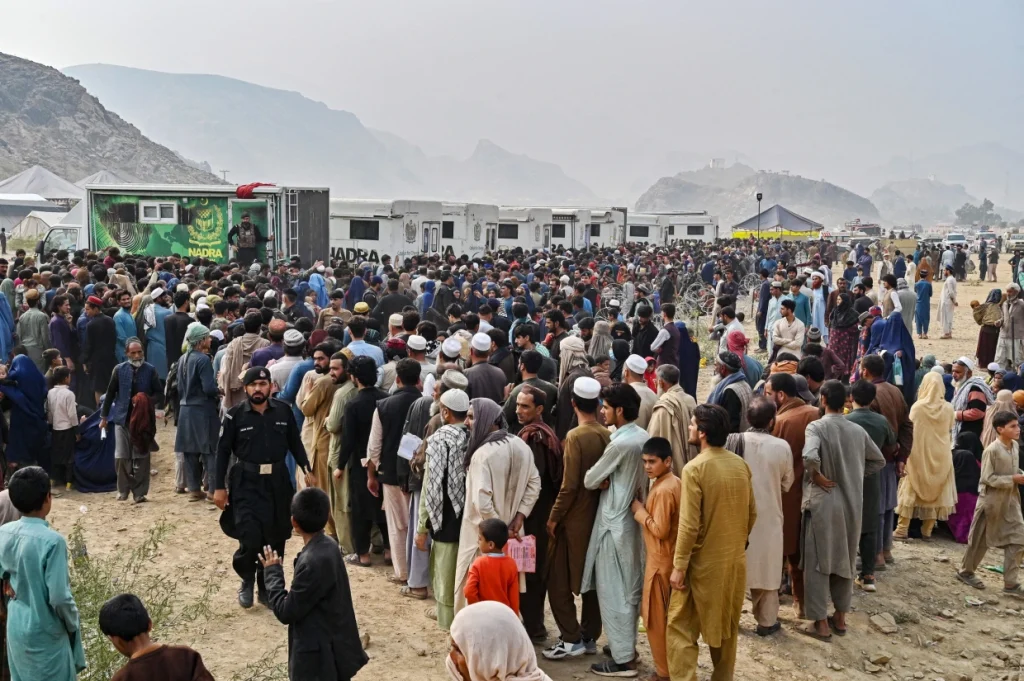Cliff Notes – Pakistan Intensifies Deportations of Afghan Refugees
- Pakistan has expelled thousands of Afghan nationals following the expiration of a deadline for Afghans without legal status, with over 8,900 deported since April 1, according to the UNHCR.
- The Taliban government has condemned the actions, labelling them “forced deportations” and accusing Pakistan of violating international obligations regarding refugee rights.
- Rising tensions between Kabul and Islamabad have led to concerns over the treatment of deported Afghans, with human rights groups criticising Pakistan’s crackdown amidst political frictions.
Pakistan Intensifies Deportations of Afghan Refugees
Pakistan has expelled thousands of Afghan nationals in the past week in a fresh repatriation drive after a March 31 deadline to leave expired.
Afghans holding Afghan Citizen Cards (ACC), issued by Pakistani authorities and held by 800,000 people, according to the United Nations, were told to leave or face deportation to Afghanistan after the deadline.
On Tuesday, the UNHCR, the UN’s Refugee Agency, reported that at least 8,906 Afghan nationals have been deported since April 1.
A Pakistani government official confirmed the move and stated, “our campaign is gaining momentum, and the crackdown against illegal immigrants has been intensified.”
The Taliban government in neighboring Afghanistan condemned the “violence” used by Pakistan to expel Afghans from the country.
Human rights groups have raised concerns
Pakistan started the mass deportation of Afghan refugees in 2023.
Islamabad said the drive is part of a campaign aimed at clamping down on migrants who are in the country illegally.
About 845,000 Afghans have left Pakistan over the past 18 months, figures from the International Organization for Migration show. Pakistan says three million Afghans remain.
Afghans crossing the border have told French news agency AFP that they left their homes without taking all their belongings or money, with some rounded up and taken directly to the border.
“Pakistan is abandoning its international commitment to not send people back to where their rights are at risk,” Fereshta Abbasi of Afghanistan Human Rights Watch said.
Kabul has termed the repatriation as forced deportation. ”The mistreatment inflicted by neighboring countries is unacceptable and intolerable,” said the Taliban’s Ministry of Refugees and Repatriation wrote on X.
“All refugees should be able to take their money, belongings and property with them,” it added.
The Taliban government also accused Islamabad for using Afghan migrants for “political goals.”
Kabul, Islamabad row amid rising crackdown
Over the last three years, Pakistan’s relationship with neighboring Afghanistan has deteriorated. Islamabad holds the Taliban authorities in Afghanistan responsible for their inability to control the operations of the Tehreek-e-Taliban Pakistan (TTP), a militant group that formed in 2007 and has conducted numerous attacks on Pakistani security forces.
As cross-border tensions with the Taliban regime escalated, concerns were also raised about the well-being of Afghans in Pakistan amid reports of purported intimidation and arrests. The UN special rapporteur has expressed his worries, stating that Afghans in the area deserve more humane treatment.
Pakistan said it plans to accelerate the drive to repatriate millions of Afghans who crossed the border during decades of armed conflict in their home country and after the Taliban seized power in 2021.
Additional sources
Thousands of Afghan refugees return to Afghanistan via Torkham as Pakistan intensifies deportations – Arab News
Taliban condemn Pakistan’s deportation of Afghan migrants, seizure of property – Amu TV
Afghan women’s rights activists in Pakistan fear deportation – InfoMigrants
Afghan-owned businesses shut in Pak amid mass deportation – deshsewak.org


